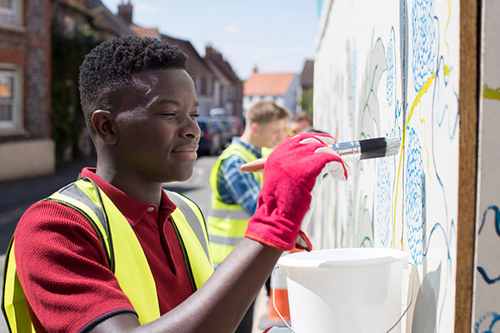4 Types of Community Service That Colleges Want to See

When you serve your community, your impact can have more power than you know. Cleaning up a local park makes it safer and more pleasant for visitors, but it can also save wildlife. Donating meals to unhoused members of your community will feed them for a night, and it can give them the energy to get back up on their feet. Reading to a young child who lacks access to books can help catch them up to grade level, and it can set them up for success later in life.
Community service not only improves your corner of the world and you as a person, but it also improves your chances of getting into college too! Most colleges do not require applicants to do community service but consider it highly valuable to your application, as it shows you have high character. College admission representatives say including your community service experience on your application or college essay helps paint a clearer picture of the type of student you’ll be in college.
Whatever you do, don’t phone in service hours for a cause that doesn’t interest you just to throw the act of service onto your resume to check a box. Find work that is personally meaningful and makes you feel inspired when you’re done. There’s a fulfilling and fun community service opportunity out there for everyone! Here are four types of community service that colleges like to see on your application.
Service Learning
Service learning is community service that’s connected to academic learning. In a class, you may learn about an issue or problem and then go out into the community to do research or work on solving these problems. This is also called “experiential learning” because it’s based on actual hands-on experience, which can be way more exciting than studying from a textbook.

You’re likely to find great service learning opportunities in social studies or humanities classes, like psychology, sociology, or civics. But service learning is not limited to these subjects. In chemistry, you could test a nearby lake for common toxins, write a report on what you find, and advocate for safer water to your local representatives. For art class, you could create art out of recycled materials and host an exhibit at a local art gallery.
Service learning is one of the types of community service colleges love to see because many college courses will have an experiential learning component. Show off your ability to learn from your environment and connect your discoveries back to academics — just like a college student. Brainstorm some ideas for service learning in your favorite classes and bring them to your teachers or borrow from this list. They’ll be thrilled to see you take the initiative!
Summer Volunteering
For most North Carolina high schoolers, summertime means weekend trips to the beach, part-time jobs to earn money, and extra time with friends and family. It’s also a golden opportunity to do life-changing community service.
In the spring, contact local nonprofit or mutual aid organizations, charities, shelters, or schools, and ask if they need summer volunteers. Go for reputable and established organizations that have a history of employing high school volunteers; your school counselor can also help direct you to legit places. Common summer volunteer sites include hospitals, arboretums, and day camps.
Got a taste for adventure? Consider volunteering abroad over the summer! Research these opportunities early in the fall before the summer you want to serve, as program coordinators often set early deadlines to submit paperwork or deposits for travel.

When colleges see that you spent your summer engaged in community service, they’ll know you could have spent it any other way — and will admire your dedication.
Student-Led Service
Leadership demonstrates responsibility, maturity, and courage, and colleges consider it a major strength in applications. Take the lead on a service project, or head up a team of volunteers.
Not sure how to step up? Get a group of friends and classmates on board with using their winter or spring break to go to a place recently affected by a natural disaster, then take the lead and plan the trip.
Coordinate a gift donation initiative during the holidays. Plan and promote a service day in a community garden to benefit a nonprofit organization.
Don’t worry if you make mistakes or not everything goes according to plan. Great leaders all make mistakes, but they learn and grow from them.
Do What You Love!

What makes you feel alive? What have you always loved to do? Find a service opportunity that lets you do it! This rule applies to all types of community service. Community service is a chance to pursue your own passions, serve the greater good, and show colleges what makes you, you. Put your heart into it!
Maybe you love animals and want to work in an animal shelter or at an adoption agency. Perhaps you grew up taking care of your siblings, so volunteering at a school or youth organization sounds like more of the same — but you’ve always had an interest in coding. Create a website or app for a local organization.
Got a dream of starting your own business one day? Start a GoFundMe for a cause and promote it through social media. The goal is to always do something that you’re excited to share with others — especially your dream schools.
CFNC Helps You Build the Ultimate College Application
CFNC is your one-stop-shop to create outstanding college applications! FYI, community service experiences make excellent essay topics, and we’ve got tips on writing amazing essays here.
You can even practice applying to college using our Practice Application — it’s just like the real thing! We also help you with other important tasks like requesting transcripts and completing the Residency Determination Service (RDS) online interview to apply for determining residency for in-state tuition in North Carolina and North Carolina state grants. Get your hands on the ultimate college application toolkit and create your free CFNC account today!